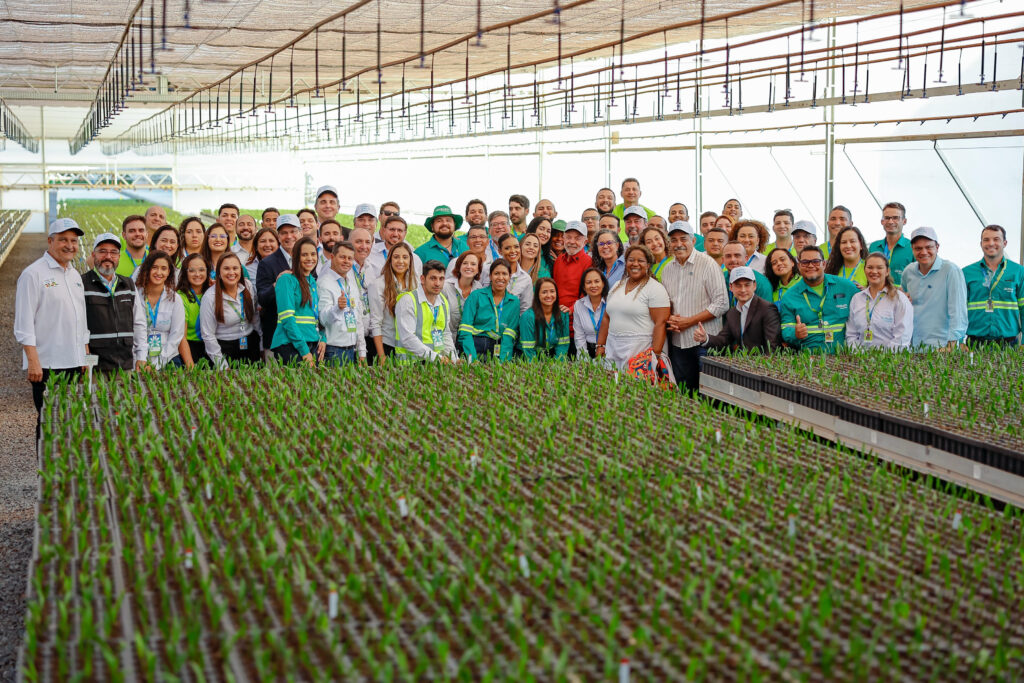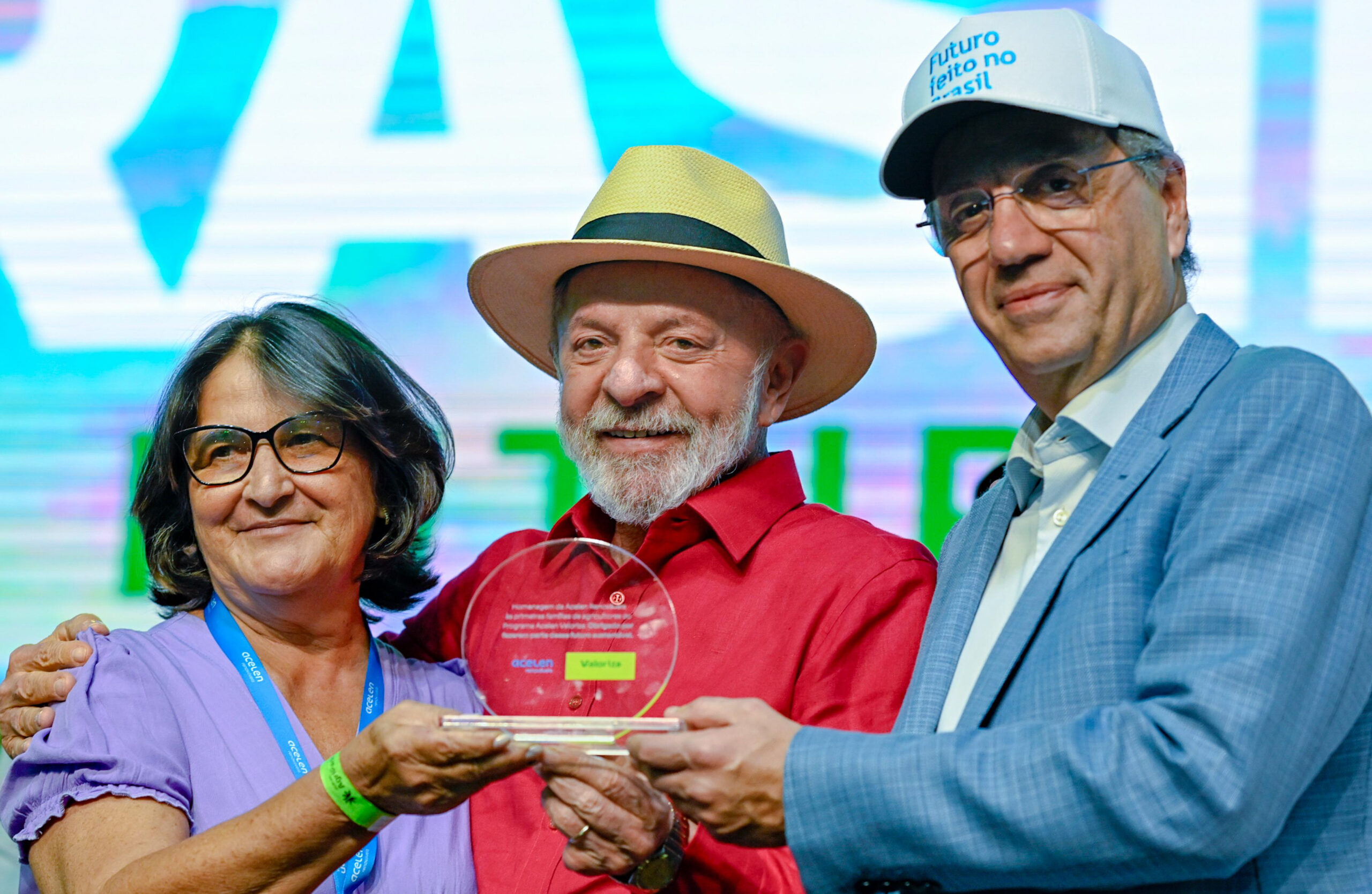With President Lula in attendance, the space gains recognition as a global benchmark in technology and innovation for the macauba chain
Acelen Renewables, an energy company owned by Mubadala Capital, inaugurated its Agro-industrial Technological Innovation Center—Acelen Agripark—on Friday, August 29, in the city of Montes Claros, Minas Gerais. The site brings together research, innovation, and technology for the development of macauba, a feedstock that is the company’s big bet to produce 1 billion liters of sustainable aviation fuel (SAF) and green diesel (HVO) per year.
Integrated into the Federal Government’s Growth Acceleration Program (PAC), Acelen Renewables’ biofuel project estimates initial investments of US$3 billion in the construction of its first integrated plant, which includes, in addition to Acelen Agripark, the construction of a biorefinery in Bahia and the planting of macauba on degraded land, among other infrastructures. In line with the country’s climate priorities, the initiative is also included in the list of Brazil’s Country Program with the Green Climate Fund (GCF), as announced by the Ministry of Finance on July 31, 2025.
The inauguration ceremony was attended by President Luiz Inácio Lula da Silva, who was accompanied by the Ministers of Mines and Energy, Alexandre Silveira, of the Civil House, Rui Costa, and of Human Rights and Citizenship, Macaé Evaristo. Also present the event were Senator Rodrigo Pacheco, the Mayor of Montes Claros, Guilherme Guimarães, as well as several teams from Acelen Renewables, particularly employees who work at Acelen Agripark. The space represents a disruptive initiative for the production of biofuels made from macauba, a Brazilian plant with high energy potential which will drive the decarbonization of aviation and the heavy transport industry.
“We have more than 40 million hectares of degraded land that we can restore by producing things other than what we already plant. That is why today is very special for me: it is a dream that is definitely becoming a reality. And I saw the faces of the young people who work in this factory and I sincerely saw the eyes of people who dream,” said President Lula.
Luiz de Mendonça, Acelen Renewables’ CEO, highlighted the pioneering nature of the venture and reinforced the project’s relevance for the country. “With Acelen Agripark, we are inaugurating the world’s largest center designed for macauba, transforming this plant into a scalable energy solution. Brazil can and must take the lead in energy transition, and today Acelen Renewables reaffirms its contribution to this sustainable future,” he said.
Acelen Agripark in numbers
- 138 hectares, of which 59 will be used for experiments (eight experimental areas and one control area)
- 27.7 hectares of a Permanent Preserve Area (APP)
- 19 hectares under environmental rehabilitation – PRADA (Program for the Rehabilitation of Degraded Areas) and PTRF (Technical Project for Flora Restoration)
- 5 hectares for the nursery (seedling production)
- The agro-industrial complex has a total built area of 150,000 square meters
- Capacity to germinate 1.7 million seeds per month
- Production of 10.5 million seedlings per year
- Creation of 200 jobs
- Construction began in August 2024 and was completed in exactly 12 months
Development of macauba at Acelen Agripark

As part of this effort, the company is allocating R$314 million to Acelen Agripark, of which R$ 258 million financed by the BNDES, consolidating the center as a strategic pillar of the bioeconomy in Brazil.
“On the eve of COP30, Brazil is advancing in the decarbonization of aviation and the heavy transport industry with the support of the BNDES. We are the largest financier of renewable energy in the world and of electric buses in Latin America: R$3.8 billion for the acquisition of 1,701 vehicles,” says BNDES’s President Aloizio Mercadante.
All the work carried out at Acelen Agripark will be guided by the mapping of native Brazilian savannah trees with the greatest potential for oil production, forming the germplasm bank for the selection of the best plants, cloning, and genetic improvement.
The center will also work on developing key processes for efficiency and productivity gains, including germination protocols, seedling production, automation to reduce losses and costs, experimental crops aimed at adapting the species and increasing oil yield, as well as the construction of a pilot plant and units for extraction, characterization, and processing of oil and co-products.
These advances have already begun to generate results: earlier this year, Acelen Renewables’ agro-industrial team carried out the first industrial extraction of macauba oil—a historic achievement made possible by unprecedented technology.
“Macauba has been researched and tested on a small scale for over 70 years globally and for about 30 years in Brazil. In an unprecedented way in the world, here at Acelen Agripark we have integrated and leveraged this knowledge with technology to ensure a global scale. It is a solid project that brings together national and international institutions, including universities, research centers, and other partners for industrial and agro-industrial solutions, tracking, and certification,” concludes Luiz de Mendonça, Acelen Renewables’ CEO.
Acelen Valoriza
During the event the company also launched its Acelen Valoriza program, which will foster productive inclusion in the countryside through partnerships with local producers and family farmers—an essential step toward building a cleaner, fairer, and more inclusive future.
Maria Eunice Soares de Machado Costa, 60, better known as Dona Nice, represented the farmers of Montes Claros when she received a commemorative plaque from Acelen Valoriza. A member of Copper Riachão since 1992, when the association began, she became a reference, along with her nephew Vlaney, in the reestablishment of the cooperative in 2021, after two years of interruption due to the pandemic.
With more than 20 years of dedication to macauba cultivation, Dona Nice sees this movement as the fulfillment of a long-held dream of her family, passed down from generation to generation. Today, her children and grandchildren also participate in Cooper Riachão’s activities, reinforcing the family legacy and the role of agriculture as a route for regional transformation.
Based on technical, economic, and socio-environmental studies conducted by FGV Europe, in its first phase the Valoriza Program plans to cultivate 36,000 hectares—20% of the total planned area, which is 180,000 hectares—with an estimated 1 million tons/year of fresh fruit. Expected to be fully implemented by 2026, it should become a driver of regional development by restoring degraded areas, generating income, and strengthening family farming.
About Acelen Renewables’ macauba project
Macauba is a Brazilian plant with high energy potential, which is 7 to 10 times more productive per hectare planted than soybeans. Acelen’s biofuels will be fully drop-in and have the potential to reduce CO2 emissions by 80% compared to those of fossil fuels, without taking carbon sequestration into account.
Recently, together with the Luiz de Queiroz School of Agriculture (Esalq/USP), Acelen Renewables announced that it had achieved a high-quality reference genome for macauba, with 98.3% gene completeness. Also, in partnership with the State University of Montes Claros (Unimontes), it created a new protocol that simplified the process and increased the germination rate of macauba.
In May of this year, Acelen Renewables began planting macauba seedlings on its model farm in the municipality of Cachoeira, Bahia. In the first stage, 198 hectares were cultivated and around 90,000 seedlings were planted using cutting-edge technologies and agronomic practices that respect the soil and the environment.
Acelen Renewables’s macauba project will create economic and social opportunities from seed germination to fuel distribution, making the company a driver of sustainable development. Over the next decade, according to a study by FGV, the initiative will generate up to 85,000 jobs in the implementation of a new production chain and inject US$40 billion into the Brazilian economy.
About Acelen Renewables
Acelen Renewables is an energy company created by the Mubadala Capital investment fund to accelerate the global energy transition through the production of renewable fuels made from macauba. Its purpose is to be a leader in energy transition, generating a significant impact on the economy, the environment, and society. Learn more at acelenrenewables.com.
